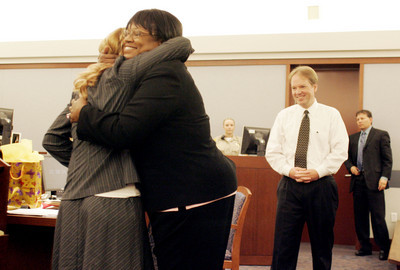Former prostitute earns a win
Three years ago, Laura moved to Las Vegas from California for the simple reason that she had just turned 21 and it seemed like the place for her to be.
She quickly found out Vegas is a tough place for people without money and friends.
So Laura -- who asked that her last name be withheld because she has a new life -- turned to prostitution after meeting a woman who claimed to make good money at it. And then crack cocaine seduced her.
"I started smoking stuff I shouldn't have been and got really hooked," Laura said Tuesday. "I started spending all the money that I made on that, and it was just horrible."
But things are different now.
On Tuesday, Laura, 24, became the first graduate of Women In Need, a program run by Las Vegas' Municipal Court that offers counseling and rehabilitation for women with multiple prostitution convictions.
She had to stay clean of alcohol and drugs for a year -- verified by random and frequent testing, not get in trouble with the law and meet regularly with counselors.
The program provides help with housing and employment. If participants fail to meet the requirements, there's a potential 180-day jail sentence waiting for them.
"It may sound simple," said Municipal Judge Bert Brown after describing the program. "But these ladies have to overcome a lot. For them to overcome, that takes a lot of effort."
Not everyone is up to it.
Before Laura's celebration, Brown ruled on several cases involving other women picked up on prostitution charges.
One had enrolled in the WIN program but was arrested again on a new charge. She faced a 120-day jail sentence but had the option to take the case to trial.
"It's OK," she said to Brown, choking up. "You gave me a chance. I'll take the time."
Another woman was offered the chance to enroll in WIN but declined, pushing instead for the most lenient jail sentence she could get. She got 150 days, of which she probably will serve about 100 days, Brown said.
Beverly Golston of the court's Alternative Sentencing Division said she is not surprised when women turn down the WIN program. The requirements are tough, the women are monitored, and it lasts a year. By comparison, three months in jail can look good.
"To have someone for a year or more tracking where you are, what you do, and having guidelines -- the counseling, the random drug testing, the status checks -- some of them say, 'It's too much. I'm not ready,'" Golston said.
"Supervision is something that a lot of these girls aren't used to. Girls out there on the street, they think, 'I can get by.'"
Laura was arrested several times during her two years in "the life" but was wary of the high level of supervision required by the WIN program. At first, she turned down the chance to enroll but changed her mind when she was denied bail.
"I wasn't really going to do it," Laura said. "I was trying to get out. I just wanted to go back to smoking and doing what I was doing.
"But something told me that maybe I should give it a try. I was really tired of how I lived."
The program put her in a halfway house for six weeks. She found a job dispatching taxis and got her own apartment and now is an apprentice learning a construction trade.
Drug tests verified that she is clean, court officials said, and she has not run afoul of the law since she entered the program.
"When I made it to the halfway point, I realized that I might actually complete this," Laura said, taking a break from digging into a celebratory piece of chocolate cake. "It feels so good to be drug-free, and be working.
"I kinda never thought I would succeed. A year ago, I didn't think I'd be here. I just wanted to get out of jail."
Six women are enrolled in the program, which is funded by a $152,000 grant from Las Vegas.
Contact reporter Alan Choate at achoate@reviewjournal.com or 702-229-6435.

















